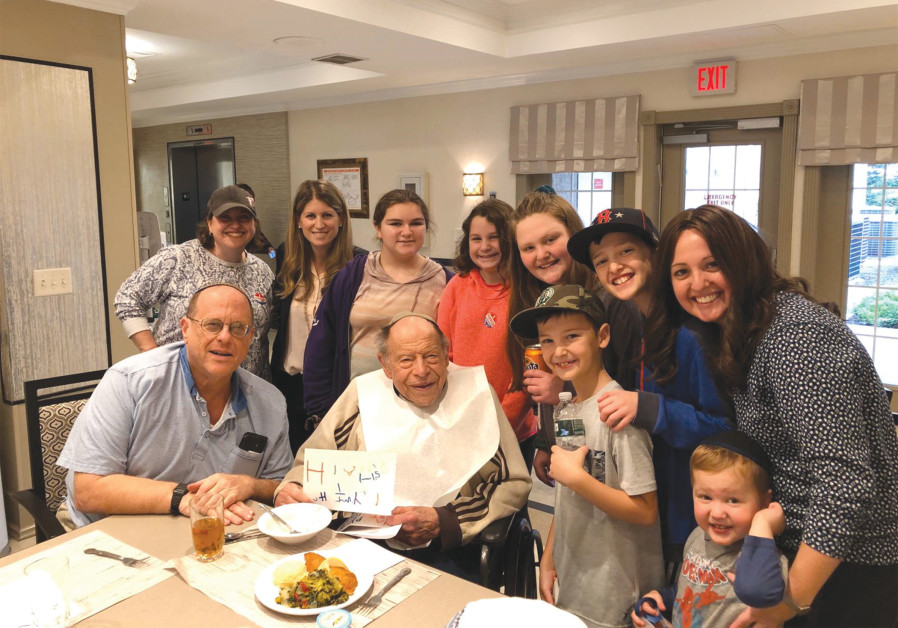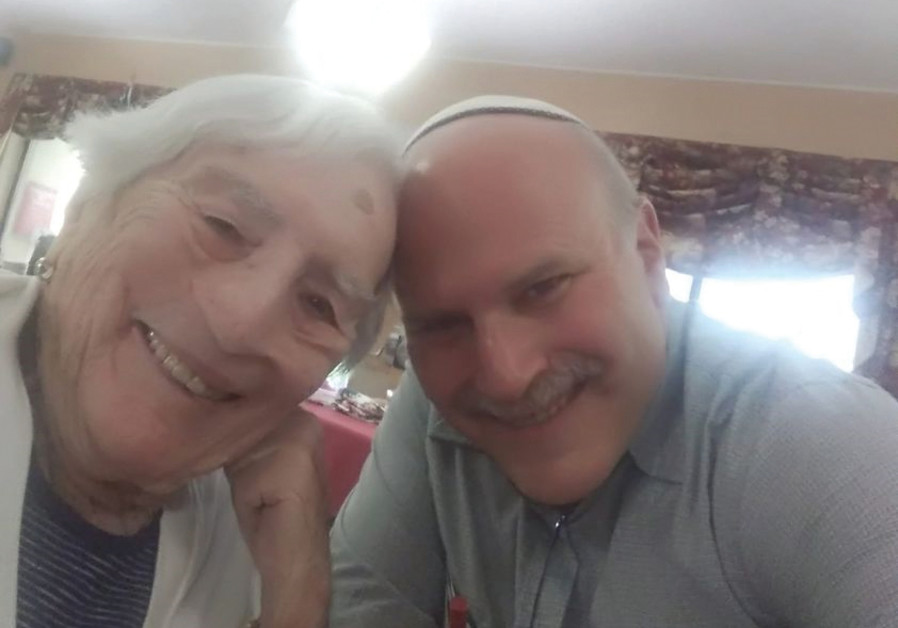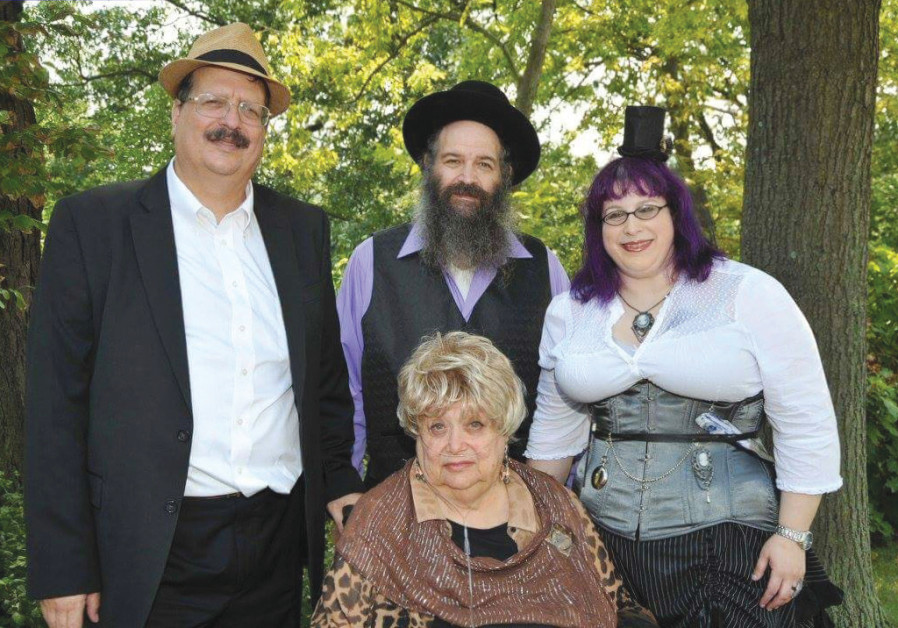Dr. Ethan Eisen is a licensed clinical psychologist with private practices in Israel and America. Trauma, loss and managing grief have been a significant part of his practice, emphases that became even more pronounced since COVID.
“For many people, a virtual shiva is like salt on a wound, and is the source of tremendous pain and despair, as they are alone and lonely at exactly the time that they are seeking comfort from their loved ones and community. Mourners may develop feelings of anger and resentment as a result of the circumstances,” he explained.
Colleen Bamberger of Sussiya sat shiva for her father, Joe Lurie, whose funeral in South Africa she attended by Zoom. Her challenges with the experience began at the funeral itself, which she said, “was very frustrating as I could not hear the hespedim [eulogies], including the one I wrote, which was read.”
As a kidney transplant recipient, even the in-person visits Bamberger received were conducted from behind a divider. She also received some video calls, which she characterized as “very hard” because she was “so devastated.” The painful reality was exacerbated by having “one brother [who] was sitting in Australia and one in South Africa. I so wish we could have been [sitting] together.”

Sam Zimmerman from Nof Ayalon sat shiva for his father, Morris Zimmerman, who passed away in America at the age of 95. Blessed with relatively mild weather for February, Zimmerman was able to “have outdoor minyanim on our lawn.”
At the time, Nof Ayalon was a COVID red zone, so in-person visits were held outdoors and limited to locals. For three hours each evening, Zimmerman also held Zoom meetings.
His experiences with the Zoom visits were mixed. “I felt that I was able to connect, somewhat, to the people on Zoom at night. I felt, however, that I did not get the chance to speak to some of the people as much as I would have wanted to. Some times the Zooms were fun, especially when my brother and nephew in America showed pictures and heirlooms that they had taken from the house.”
Although he credited the virtual shiva experience with giving him “more time to breathe, relax and reflect than there was at my mother’s shiva, I will say that for me, the negatives did outweigh the positives. In essence, I guess I feel that a man of such stature (his parents were community leaders in Teaneck, New Jersey) deserved something more. My father was 95 years old at his death, and completely lucid and, as ever, highly intelligent.”
Another downside of COVID-era shivas that Eisner shared was that, “minyanim in the home and reciting kaddish is equated, for many people, with properly honoring the deceased. If having a minyan or reciting kaddish is not possible, it can feel like the shiva is incomplete or hollow, which can be a painful experience for the mourners.”
Gidon Ariel of Ma’aleh Hever, sat shiva for his mother, Selma Reich, whose New York funeral, at the very beginning of the pandemic, he attended virtually. “I believe there were no limitations at all when I started and the country was in full lockdown when I got up. That is probably an exaggeration, but that is my recollection.”
His original intention was foiled by the country’s increasingly strict lockdown parameters. “I wanted to hold minyanim in my home, but within a day or two, it was clear that that was not going to happen. I received some visitors via Zoom, maybe a few phone calls and I participated in Zoom minyanim from home.

After making funeral arrangements for her burial in Pittsburgh, Michael Nemoy sat shiva for his mother Rosalyn (Shoshana) Nemoy in Givat Shmuel. Most of his visits were during open hours prearranged on Zoom. A few local visits were limited and held “on the front porch with proper precautions.”
Like Ariel, a shiva minyan in the house was not an option, but he was able to attend “a small outdoor minyan to say kaddish every day.”

Rachel Weinstein, a social worker from Beit Shemesh with extensive experience in hospice work and grief counseling, explains how some aspects of a virtual shiva experience can actually be superior to a traditional shiva, which can feel overwhelming for mourners.
“I think shiva by Zoom, or whatever platform you use, gives you an opportunity to take that space and step away from the virtual throngs of people who want to love you when it is convenient for them.
“The ability to turn the computer off, put the phone down and not apologize for taking the break you need to the people you have to wade through to get to the bathroom or bedroom? That can be a relief.
“Another layer to this however, is that virtual shivas have allowed folks from across the world to support those in mourning. Pre-COVID, that was something that happened on occasion. This year it became a lot more [common] because frankly, it was frequently the only choice we had. This once less-common support was normalized and became part of the ritual itself.”
Chaya Grodner of Kfar Adumim sat shiva for her brother Mel Morris early in 2020. She did not attend the funeral, which was held in Florida, and she received shiva visits via telephone, Zoom, Facebook and WhatsApp.
While emphasizing that, as “a very social being,” she missed the opportunity to be near friends and family physically, she did note one upside in her experience.
“When I was tired and needed to rest, I could, without feeling the need to be with those who came to be with me. I would never have left them as their personal visits could have entailed long travel, time off from work, away from their families to be with me. Tired or not, I would have wanted to be with them.”
Shoshana Hurwitz of Ma’aleh Adumim sat shiva for her father, Dr. Eugene Scheide. Attending his funeral in America was not an option due to travel restrictions, but Hurwitz reported using “a website called Picktime for family and friends to schedule virtual shiva calls. They called or video-called me at their scheduled appointment time. Other than a few random calls outside of my scheduled shiva hours from people who didn’t know I was doing scheduled virtual visits, most people kept to the schedule, and it worked out very well.”
While Hurwitz concurred, emphasizing that “not getting hugs from my loved ones” was a significant downside overall, the system she created worked fairly well. “As an introvert who prefers one-on-one conversations as opposed to big groups of people, I was actually pretty satisfied with getting calls one at a time and mostly knowing exactly when the calls were coming in advance, so there were few of the surprises that might occur in a regular shiva.”
Eisen reminds people of an important takeaway from the COVID-era shiva experience. “We can be creative about how to be supportive of others during their mourning when the traditional ways are not possible. For example, writing a letter to the mourners that shares personal reflections or stories can be a powerful and lasting source of comfort for mourners, sometimes even more meaningful than a visit.”
“Zoom shivas are a pretty incredible substitute for not being able to be there in real life. And I think they are a testament to how important this ritual is to each of us. I don’t think most of us would’ve opted for observing death and mourning by computer, but we didn’t let lockdowns or a global pandemic stop us from being present, even if it was in little boxes on a screen,” Weinstein concluded.
